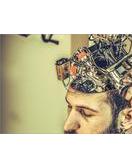
Prognosis
Superficial siderosis can damage the cranial nerves which could prevent a cochlear implant from working. It wasn’t an easy decision to make by any means, I had so many questions, but it all came back to the point that having a chance to hear again, is better than not hearing at all. Cochlear implant surgery is classed as routine surgery unlike many of the high-risk neurosurgical operations I’ve had in the past. My mindset was, and still is, that if it works it’s a bonus, and if it doesn’t work, I’ve been profoundly deaf for 5 years, so have nothing to lose.
Pre-op Admission
I attended a check up to make sure my general health was all okay before the surgery took place; something which I’m used having done prior to surgery. ECG, height, weight, discussing my medication and having bloods taken to check for infection, and to make sure it clots okay. For once, having bloods taken was relatively quick, as the nurse who took my blood really knew what she was doing. She even explained to me that my veins tend to move about, which is probably why getting blood from my arm is usually a long-winded task. I was most impressed that my blood results were uploaded to the MyCare patient portal less than an hour after I had blood taken. To put this into contrast, in Wales there is no online portal for results, and it takes at least two days for me to get the results, in which I must drive to the hospital in Cardiff to pick them up as the NHS Wales email address isn’t encrypted, so they won’t send them via email.
Operation Cancelation December
Having had next to no hearing since 2018, I was really hoping to have the surgery as a late Christmas present. Sadly, it wasn’t to be, and I had an email to say that the hospital would be closed for the Christmas period. I felt a bit like Jamie from the ‘Jingle All the Way Movie’, who really wanted a Turboman Doll for Christmas, but he did eventually get it, and I knew that the operation was going to happen at some point.
Cochlear Implant Day- with a Palantypist
Soon after the cancellation, I was given the new date of 19th January for the operation and was invited to attend a group meeting with other patients who were also due to have cochlear implants fitted. I was most impressed with the accessibility of the meeting. There was a British Sign Language (BSL) interpreter, and a huge screen on the back wall where speech was transcribed to text in real-time by a palantypist. On the invite letter I had for the meeting, it said I would be choosing the device, but I was told at the meeting that the device had already been chosen for me. Thankfully, it was the Nucleus 8 processor, which was the one I wanted anyway. In London the BSL sign for the number 8, is what the BSL sign for the number 3 is in Wales. I was aware of that though, as I had initially learned the numbers for the London version of BSL, having had no idea there is regional variation until I started having formal lessons.
At the meeting we were given the chance to individually ask questions, but as my only questions were related to superficial siderosis, most of the answers were unknown. Although to my surprise, Leah, the person hosting the meeting, actually knew of superficial siderosis, and had come across others who had cochlear implants fitted. All the ‘ins and out’ and ‘dos and don’ts’ of a cochlear implant were discussed, and we got the chance to try them on as well.
More Operation Cancelations
Typically, the nurses strikes were set to take place on the 19th of January, which was the scheduled date of my cochlear implant operation. A week prior to the admission date, my mom received a telephone call from the hospital to say the operation had been cancelled, and that I would be provided with a new date as soon as possible. I was given the new date of 2nd March, and because of significant amount of time had passed since the pre-op in December, I had to liaise with my immunology team in Cardiff to have a new set of updated blood tests.
I emailed the admissions department a week prior to the new operation date, just to make sure all was okay to proceed. I didn’t receive a reply, so assumed all would be good to go. Surely everything would be okay now, and it won’t get cancelled less than a week before it’s due? I couldn’t have been any more wrong, and two days prior the admission date I received an email to say it was cancelled, this time ‘due to equipment not being available.’ Obviously, my parents and I were quite annoyed, as once again we had to cancel the hotel and car park booking. Thankfully it wasn’t a day later as we’d have already been driving to London.
The multiple cancellations did however prompt me to contact PALS (Patient Advice and liaison Service), because my parents had booked annual leave from work on multiple occasions, and it was beginning to add up.
It Finally Happened!
Following the multiple cancelations of the operation, my mindset was now that I wouldn’t believe it was happening until I was on the surgery ward waiting to go down for the operation. Initially I was told it was going to be a day procedure, but once the anaesthetist saw my medical history, she didn’t hesitate to inform me that I would be kept overnight for monitoring. I informed her how difficult I am to canulate (put a line in my arm so fluids/drugs can be administered), to which she said they may need to use an artery in my groin. Thankfully the team had a handheld ultrasound scanner and found a vein in my arm straightaway. Phew!
Once I came around after the operation, I found myself on the intensive care recovery ward (courtesy of the anaesthetist). I only had a sore head, and no severe vertigo like my sign language tutor had experienced when she had a cochlear implant fitted. However, I did have a slight temperature and was kept in for two nights as opposed to the single night that was initially suggested.
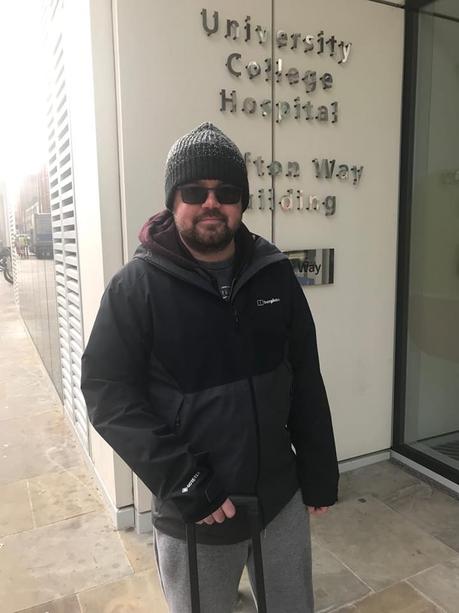
For the second night I was moved to the ENT ward where the nurse removed the bandage from my head, so now I no longer looked look a makeshift version of Daniel LaRusso from Cobra Kai. The ENT doctors had spoken with microbiology who advised they believed my temperature was more of an inflammatory reaction rather than an infection. I was told I could go home, but now had to wait for my parents to pick me up as they had driven back to Wales because they didn’t know how long I was going to be kept in hospital for. When they arrived, the nurse informed us that I would need to come back in a few days to have some scans on the implant to make sure it was in the correct place.
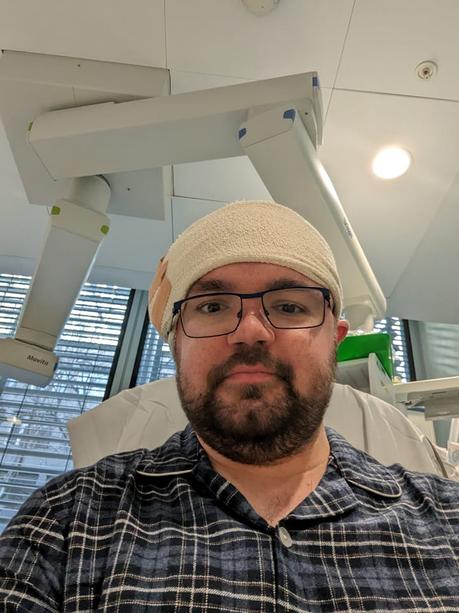
<<<<<< Makeshift Karate Kid
Back to the Capital
Following my discharge from the hospital on Saturday, I was back in London on the Monday for a neurology appointment, then home for a day, and back again on the Wednesday for the CT cone scan to make sure the implant was in the correct place. The scan didn’t take long at all, and the next appointment was to have the implant switched on, and with 3 further appointments to tune it.
The Big Day – The Switch On
Since the prospects of the cochlear implant working in patients with superficial siderosis is relatively unknown and I’d spoken to people with various outcomes, I was reluctant to get my hopes up; but I’d be lying if I wasn’t excited about getting the implant switched on. My mum, dad and I once again ventured to the Royal National ENT hospital in London, and once we arrived my nerves began to kick in. There were a few things going through my mind, such as will I be overwhelmed when it’s turned on? Will my tinnitus get better, or worse?
We attended the outpatient’s department, and both of my parents came into the appointment with me. Firstly, I saw an audiologist, who looked at the scar and said that it had healed nicely, although there was a bit of swelling. I was sat in the middle of the room, with my parents either side of me and the audiologist sat in front of me behind the computer. The audiologist hooked the implant up to the computer and began to play various sounds through it, in which I had to note the loudness using a sheet with a scale labelled 1-10, with 7 being comfortable loud. I turned my head away so I couldn’t see the audiologist clicking the mouse, and to my amazement I could hear sound again.
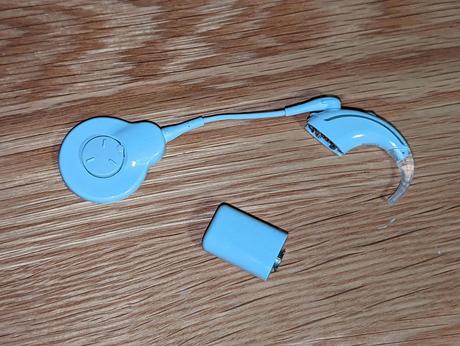
Once the audiologist had played a series of sounds of different pitches and tones, and I had given her and indication of how loud each one sounded, she showed me the processor. It looked slightly lighter in color than the one I chose back on January, but I didn’t say anything, because for me as long as it gives me hearing, I’m really not bothered. The audiologist placed the receiver on my ear and attached the magnet to my head. When she turned the processor on, I was able to hear everyone in the room, and I burst out laughing as it sounded like my mom was auditioning to join the Bee Gees with her high-pitched voice.
Based on the loudness test, the audiologist added four settings to the implant, and helped me to connect it to by phone via the cochlear app. Each setting was slightly louder than the previous, but for now I as told to stay on the first setting, which was quietest in volume.
Speech and Language Therapist
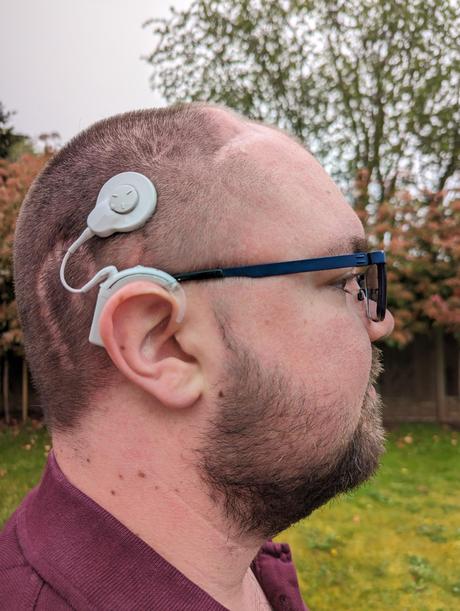
Following the switch on with the audiologist, my dad went and sat in the waiting area and my mom and I went into a room with Francesca, a speech and language therapist who I had seen on a few previous occasions. Francesca had a book to hand with similar sounding pairs of words next to each other. She read out the words to see if I could recognize the difference and understand which word she was saying. For example, ‘Ba’, ‘Ta’ and ‘Ma’, which to her surprise I could clearly distinguish from one another.
Once we had gone through all the phonetics and different sounding words, I was given some ‘homework’, which was to try and recognize different sounds around the house, in the car, etc. I was told to make an initial log of the sound and try to familiarise myself with it. Francesca told me not to listen to music, and every three days move onto the next setting on my phone that the audiologist had set, until my next appointment in two weeks’ time.
Going Home
On the way home, Queen came on the stereo in the car (Sorry Francesca, I couldn’t help myself). It was such an incredible moment to be able to hear ‘I Want to Break Free’ again. It didn’t sound like it used to, but after having five years of having no hearing, a new chapter in my life is beginning, and as I’ve been told, the sound will only improve over time.
